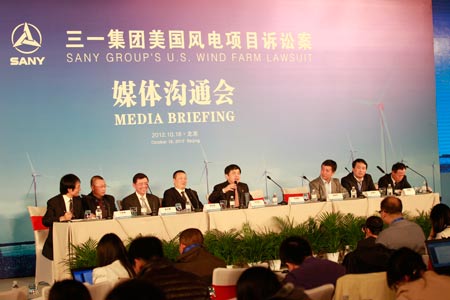Banning Sany project grave matter: expert
- By Li Jingrong
 0 Comment(s)
0 Comment(s) Print
Print E-mail China.org.cn, October 22, 2012
E-mail China.org.cn, October 22, 2012
In a commentary published last Friday on Guancha.cn, researcher Mei Yuxin with the Ministry of Commerce, put forward a suggestion regarding China's biggest machinery maker Sany Group's decision to file a lawsuit against U.S. President Barack Obama and the Committee on Foreign Investment in the United States (CFIUS).
|
|
|
During a media briefing on Oct. 18, Sany Group said that "a decree from U.S. President Obama has deeply hurt the enthusiasm of Chinese enterprises investing in the United States." |
Mei said he couldn't understand what kind of message President Obama wanted to convey to the world. Is he trying to say: "Come to the United States if you want. You will be exploited, then will be forced to leave without any compensation."
As the world's second largest economy, China has great potential to invest in the United States – the world's biggest market. Chinese investors commonly have blind faith in the commercial environment of the United States, according to Mei.
"When speaking with commercial officials at the U.S. Embassy, I felt enthusiasm on the U.S. side, and saw that they hoped to attract more investment from China," said Mei. "We noticed that the Obama administration's new plan to attract overseas investment places a high emphasis on China, India and Brazil, and is very favorable to American interests."
To promote China-U.S. economic development, the two sides have been working hard to create a better environment over the past few years, Mei said. Obvious efforts include new bilateral investment protection agreement talks, which started two years ago and are ongoing.
However, the U.S. House of Representatives Intelligence Committee on Oct. 8 issued a groundless report alleging that Chinese companies Huawei, ZTE, and Sany posed a possible threat to U.S. national security. The report recommended that regulators block Huawei and ZTE from acquiring U.S. companies, adding that government computer systems should not include components made by them because they "might pose an espionage risk."
Mei said that the report will blur bilateral direct investment because Chinese investors can't be sure what kind of treatment they will receive after they enter the U.S. market.
According to Mei, Sany's case is of particular concern. This was not the first time a Chinese investment in the U.S. had been blocked using "national security" as an excuse. The U.S. government froze US$75 million in Chinese government assets before the Korean War broke out in 1950. What's the reason this time? Is it possible that Chinese and U.S. armies will go to war on the South China Sea, on Okinawa or the Korean Peninsula? This is not a reasonable course of thought.
"We couldn't see any legal basis or logic in this case," said Mei. The behavior of the United States is not only a violation of the laws of the United States, but also a violation of international laws, and specifically a violation of the Sino-U.S. bilateral investment protection agreements signed in the 1980s.
"Personally, I think it's already time for the Chinese government to begin diplomatic negotiations with the United States," said Mei. "The case will inevitably create obstacles for the ongoing China-U.S. investment protection agreement talks."
Mei hopes U.S. authorities correct this error in judgment in the upcoming lawsuit proceedings, and won't repeat previous mistakes. "The Sany lawsuit against President Obama and his administration shows that Chinese investors are still confident in U.S laws," Mei said.
More about the Sany-U.S wind power case
On Sept. 28, U.S. President Obama blocked Ralls Corp., an affiliate of Sany Group, from building four wind farms near a naval base in northern Oregon after CFIUS argued that it posed a security risk.
During a media briefing on Oct. 18, Sany Group said that "a decree from U.S. President Obama has deeply hurt the enthusiasm of Chinese enterprises investing in the United States."
Ralls has brought a lawsuit against President Obama and CFIUS to the U.S. Federal District Court. The case hearing will be held Nov. 28. However, the possibility of winning the lawsuit is still unclear.
According to Sany Group, its investment into the U.S. is long-term and is not capable of posing any threat to U.S. national security.
It was the first time that a U.S. president stepped in to block such a foreign business deal since 1990, and Sany is the first Chinese firm to use the law to settle a trade dispute with the U.S., which sets an example for other companies, the Changsha-based company said.







Go to Forum >>0 Comment(s)